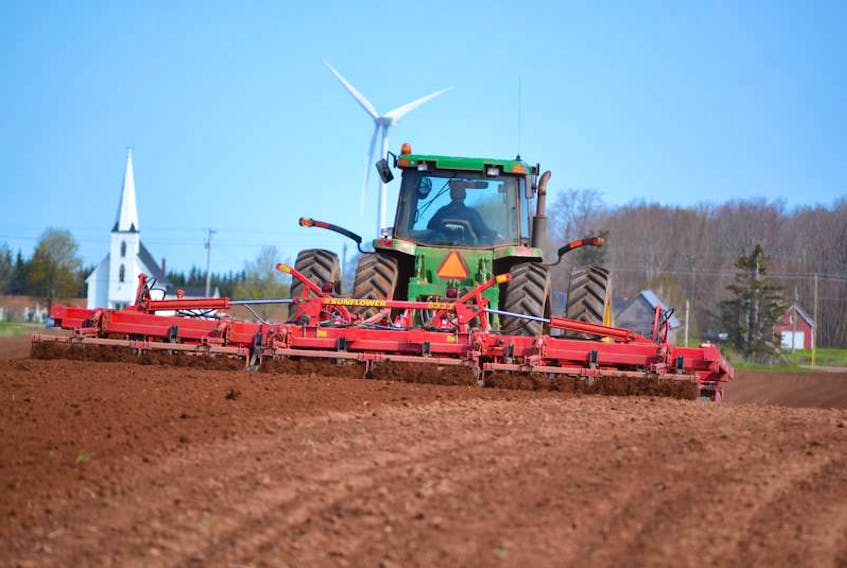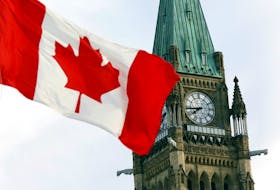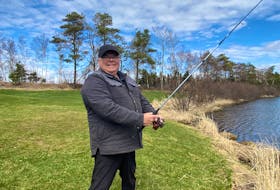You can go down to your grocery store of choice and pick up five pounds of potatoes for a Sir Wilfred Laurier and change.
Stolid, stable, and starchy, the potato is the essence of a staple crop. You might imagine the potato as indifferent to rising temperatures, drought and heavy rains. But a potato plant is still a living thing, and it’s no more immune to environmental stress than the next sessile organism.
Greg Donald, the general manager of the Prince Edward Island Potato Board, has already seen what challenges the future might hold for this crop.
“Plants are like humans. You can do everything you can to keep them healthy and be productive, but certainly environmental stress, climate change, hot temperatures up to a certain point (and) the plants basically shut down to conserve moisture. So, they’re not actively producing and they also are more vulnerable to pests, which creates more challenge.”
The last two years in particular have been a challenge for potato farmers on the Island. The spring of 2018 came late and threw in a late frost as a bonus. The cool, wet conditions made it difficult to plant. Then the summer came, hot and dry, robbing the potatoes of the moisture they need to grow. Then came fall rains.
“In PEI, we abandoned several thousand acres of potatoes that just couldn’t get harvested,” says Donald. “When freezeup came, there were thousands of acres left in the ground.”
Then 2019 followed a similar pattern, leading into the fall, when the hammer really fell.
“The week before hurricane Dorian, I had 90 millimetres of rain, which is more than we had all summer, one week. And then the week of Dorian had 120 millimetres of rain,” recalls Donald. “The hurricane did a lot of wind damage to the crop. The wind damage was very severe and along some of the coastal areas (there was) even salt damage from spray from the water.”
Weather impact
What happened in 2019 is a reminder that climate change doesn’t come in discrete effects. We talk about higher temperatures, stronger storms, floods, and droughts as though these are separate consequences. But they are all part of the same system, operating at the same time. And so, a crop like the potato can suffer shocks at multiple parts of its life cycle.
“Long story short, dry weather, higher temperatures, and then wet weather. We’re seeing a lot more extremes when we do get rain,” says Donald. “We’re getting more than enough moisture -it’s just not happening when we need it. Not enough in July and August, too much in spring and fall. I'm just speaking from my world, but that impacted many other crops.”

According to Nathan Gillett, climate scientist and a lead author on the current report by the International Panel on Climate Change, this pattern is part of a trend farmers can expect to continue in Atlantic Canada and beyond.
“In terms of the drought, the main driver, considering Canada as a whole and including Atlantic Canada, is that the rainfall is not projected to change very much in the summer, but the temperatures will be warmer and that drives increased evaporation, which causes increased drought, and that’s projected to intensify drought in summer,” Gillett said.
Growing disconnect
In a world where fewer of us grow the food that the rest consume, there’s a growing disconnect between the farm and the table. Climate change is one of the hairlines along which the disconnect can grow. One particular area of this is water access, an emotional issue on PEI.
“Even if you lived in Charlottetown or Summerside, you’d always have your parents, or your brother, sister, your uncle, somebody would have a farm in the countryside. Even on PEI, we’re now getting a generation or two away from that. Even though it’s the number one industry on PEI, there’s a growing gap between the farming community and the public.”
The push and pull over water use isn’t settled on the Island. Some in the agricultural community want to end the 2002 moratorium on high-capacity wells to help offset the effect of dry summers.

There is scientific evidence for lifting the moratorium. Currently, Islanders use only 1.4 per cent of the groundwater recharge. Of that, only 1.2 per cent goes to agricultural irrigation. But the idea of a shortage makes the conversation emotional.
“It’s a very emotional issue,” says Donald. “The science is there, the provincial government tells us. Because so few people are involved in the food production, it’s a dilemma. People just want to make sure the resource is protected. They don’t want to take the risk.”
Another concern for Canada’s smallest province is soil erosion. The pace of erosion on the Island is accelerated by these concentrated rain dumps, as well the increasing power of the waves lashing the shore.
“Our most valuable resource is our soil, and our industries evolved and we’re seeing that not just PEI, but again globally, our farming practices have changed to improve the soil and keep soil in fields,” says Donald.
“Some of the things we’ve been doing aren’t enough anymore because of climate change and these severe weather events. I don’t want to sound like doom and gloom, but it’s definitely creating a lot of challenges, and farmers are working hard to adapt and make sure that we have good, healthy food and do it in a way that’s good for the environment.”
No. Your five-pound bag of tubers isn’t going anywhere soon. But it is already feeling the impacts of climate change. The next time you’re peeling a pound, consider the future of the potato, because whatever that future is, you’re travelling there together.









